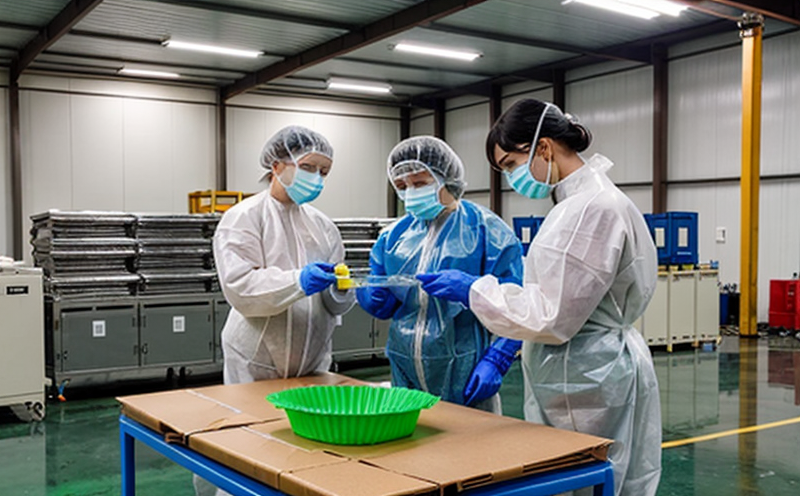ASTM D1709-12 Puncture Resistance Testing
The ASTM D1709-12 standard provides a method for determining the puncture resistance of plastic packaging materials. This test is particularly important in ensuring that the material can withstand the pressures and impacts it may encounter during handling, storage, and distribution.
This testing procedure involves applying a sharp, cylindrical needle to the specimen until penetration occurs, measuring both the force required for penetration and the depth at which penetration happens. The results are used to evaluate the integrity of the packaging material under controlled conditions that mimic real-world stress scenarios.
The test setup typically includes a specially designed puncture tester capable of applying consistent pressure in a controlled environment. Specimens must be prepared according to ASTM D1709-12 specifications, which include considerations for temperature and humidity conditions to simulate the packaging's intended use environment. Compliance with these requirements ensures accurate results that can be relied upon for quality assurance.
The test is crucial in various sectors such as pharmaceuticals, food & beverage, and consumer goods where product integrity must remain intact throughout transportation. By ensuring proper puncture resistance testing, manufacturers can prevent potential breaches that could lead to contamination or spoilage of the contents inside the packaging.
In summary, ASTM D1709-12 puncture resistance testing plays a vital role in safeguarding products from damage during transport and distribution. It helps maintain quality control standards and ensures compliance with regulatory requirements across multiple industries.
Applied Standards
The ASTM D1709-12 standard is widely recognized for its rigorous methodology in evaluating the puncture resistance of plastic packaging materials. It specifies detailed procedures, including specimen preparation, testing parameters, and acceptance criteria.
The primary focus of this standard is to provide a standardized approach that ensures consistency and reliability in measuring puncture resistance. Compliance with ASTM D1709-12 helps manufacturers demonstrate adherence to industry best practices, thereby enhancing their reputation for quality and safety.
- ASTM D1709: This standard defines the procedure for determining the puncture resistance of plastic packaging materials.
- ISO 6423: International standards often align with ASTM D1709, ensuring compatibility and interoperability across different regions.
The application of these standards ensures that all tests conducted are comparable, providing a level playing field for quality assurance in the packaging industry. By adhering to such standards, companies can ensure their products meet rigorous international benchmarks, which is crucial for global market entry and compliance with local regulations.
Benefits
- Enhanced Product Integrity: Ensures that packaging remains intact during transit, reducing the risk of product damage or contamination.
- Regulatory Compliance: Meeting ASTM D1709-12 helps companies stay compliant with relevant regulations and industry standards.
- Informed Decision-Making: Provides critical data for R&D teams to improve material selection and design for better performance.
- Customer Satisfaction: Demonstrates commitment to quality, which can lead to higher customer satisfaction and loyalty.
Quality and Reliability Assurance
ASTM D1709-12 puncture resistance testing is a cornerstone of quality assurance programs. It helps identify potential weaknesses in packaging materials, allowing for timely corrective actions before they impact the product's integrity.
The test results provide valuable insights into how well the material will perform under various stress conditions, enabling manufacturers to make informed decisions about their products' durability and safety. This testing not only enhances customer confidence but also supports sustainable practices by minimizing waste associated with failed packaging units.
By incorporating ASTM D1709-12 into their quality assurance protocols, companies can ensure that every batch of plastic packaging meets the highest standards of integrity and reliability, thereby protecting both the environment and consumer health.





